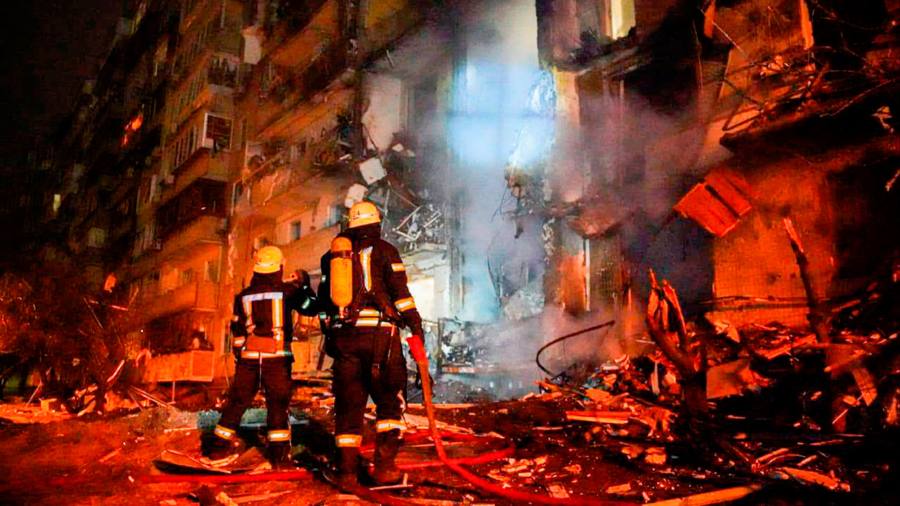Ukrainians and their friends are most concerned with the need to win the war. But putting off preparing for what comes next risks losing peace. Kiev is aware of this and is developing an economic plan for post-war Ukraine. The Ukrainian Recovery Conference in London this month will offer the country’s friends an opportunity to embrace the plans, both metaphorically and literally.
The most ambitious vision is to turn Ukraine into a driver of Europe’s green transition. Rostyslav Shurma, deputy director of economic policy in Ukraine’s presidential office, said carbon-free energy should be the main target of investment in the country’s reconstruction.
With the EU “on the cusp of a green transition,” he told me in Kiev in April, Ukraine offered many advantages: geographical proximity, important natural resources for renewable energy generation, and a nuclear energy sector that could service green hydrogen production. The country’s strong metallurgical heritage coupled with relatively cheap labor means it can fill supply gaps in manufacturing and processing as the EU seeks to diversify away from China. Shurma cited green steel, chemicals and lithium processing as examples.
This vision has strategic and economic significance for the EU and Ukraine. The relevant capabilities are there: Ukraine has unquestioned nuclear expertise and, in wartime, managed to connect its power grid to that of the European Union. Even after Vladimir Putin launched a winter campaign to bombard its energy infrastructure, Ukraine has returned to being a net exporter of electricity to Europe.
Seeing Ukraine as the center of Europe’s green transition would provide the narrative and conceptual coherence needed to commit wholeheartedly to the country’s reconstruction. Once the immediate war drama is over – hopefully soon – Europe’s political attention will be off Ukraine, let alone the United States, which may fall into the allure of isolationism or worse. A four-year plan of budget support pledges underway in Brussels to force similar action from Washington has been welcomed.
But there is still no strong political will to mobilize the financial support needed for reconstruction beyond ordinary budget aid. Without confidence in adequate public funding, private investment will not reach the required levels. (Shurma envisages 70-80% of total reconstruction spending—more than World Bank-led estimate of $400 billion – will be composed of private funds. )
So, just as the United States saw Marshall aid as a tool to shape the image of postwar Europe and create new markets for its burgeoning output, Europe today must see Ukraine’s rapid recovery as vital to its own interests. To gain voter and business support for Ukraine’s long-term strong support, look not at their altruism but at their benefits from decarbonized energy suppliers, alternatives to China’s green industry supply chains, and contributors to the hydrogen economy, Right on the EU borders, and eventually inside it.
This ambition will help to focus the planning and allocation of reconstruction spending, overcome disagreements over funding within Ukraine and between the country and its donors, and make it clear to the private sector where investment opportunities lie. Furthermore, if Ukraine is rebuilt at the upfront cost of recognized higher net-zero compliant standards and technologies, suggested Backed by US think tanks such as the German Marshall Fund and others, EU green industry companies will have a ready market to scale up. This should speed up the learning curve and reduce costs in its home market, and help it catch up or catch up with Chinese competitors more quickly.
One can legitimately question these plans, such as the risk of overgovernment in a country striving to rid itself of the remnants of the Soviet legacy. But the bigger risk is the lack of top-down direction. Even in the West, the days of leaving things to the market are over. All countries need to find the right role of government to guide structural transformation.
Another question is whether this is too ambitious and long-term to meet Ukraine’s more immediate needs. All the more reason to agree on a direction now so that Kiev can invite investors to propose projects for pre-qualification so that construction can start as soon as safety allows. At the same time, economic predictability requires support from war insurance to security guarantees and enhanced Ukrainian air power.
Ukraine’s military strength, diplomatic flexibility, and solidarity from the West have all exceeded expectations. Their economic statecraft must now do the same.
martin.sandbu@ft.com


